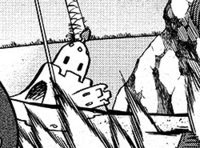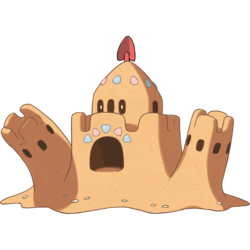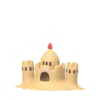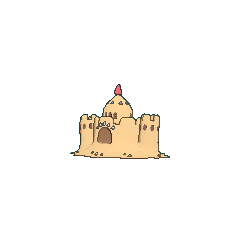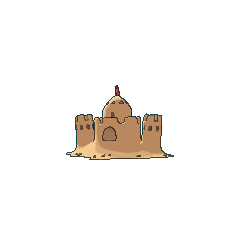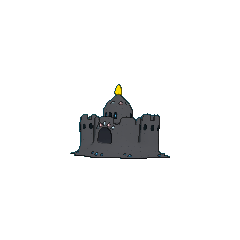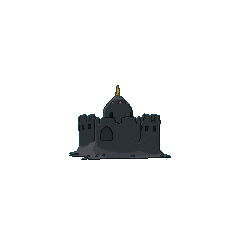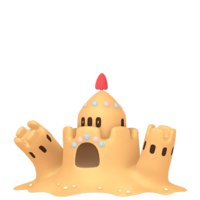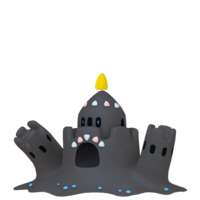Palossand (Japanese: シロデスナ Sirodethna) is a dual-type Ghost/Ground Pokémon introduced in Generation VII.
It evolves from Sandygast starting at level 42.
Biology
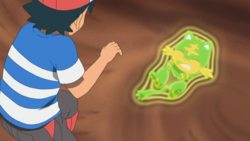
Palossand draining the vitality of its victim
Palossand is a Pokémon resembling a yellowish sand castle with gray pebbles along the base. It has a square main castle for its body, two round towers for arms, and the top of another round tower with a conical point rising up from the body. A tunnel through the center of the main body creates a mouth. There is a line of five alternating blue and pink seashells over the top of its mouth, and a similar ring of seashells surrounds the central tower just below the point. The central tower has six windows: three located in the front, one on each side, and one in the back. The two outermost windows in front of the central tower have tiny pebbles in them and appear to act as eyes. The two side towers have crenellations along the top with a ring of windows underneath. Palossand's main body has crenellations around the central tower. In the peak of its tower is a red shovel stuck handle-first into the top.
Palossand has the power to control the sand, and each grain of its body has a will of its own. It curses and control people and Pokémon alike, making them gather sand for it to build upon its body. Unlike Sandygast, Palossand is able to replenish any sand it loses on its own. The shovel on Palossand's head rotates when it searches for prey and is believed to function as a radar. Palossand can be found at beaches, having been referred to as the "Beach Nightmare"; however, it hates water. It cannot maintain its castle-like structure during heavy rainfall. As seen in the Pokémon the Series episode A Shivering Shovel Search!, Palossand can manipulate its size to grow to the size of a building and whip up sandstorms with a swing of its tower-like arms.
Palossand captures smaller Pokémon into its sandy body by dragging them down into the sand. Once they are trapped, it drains their vitality whenever it pleases, until all there is left under its body are the dried-up bones of its victims, which Palossand is able to fire from the hollows in its arms. The aforementioned Pokémon the Series episode shows that trapped victims are unable to escape Palossand's body unless it has suffered enough damage, otherwise they will be pulled back inside; it also suggests Palossand is not able to drain the life force of humans. Wherever it passes, traces of its victims' ill will are left, which are said to be the genesis of new Sandygast.[1]
Palossand and its pre-evolved form are the only known Pokémon capable of learning the move Shore Up. They are also the only known Pokémon that can have Water Compaction as an Ability.
Evolution
Palossand evolves from Sandygast.
(For specifics on this Pokémon's evolution in the games, refer to Game data→Evolution data.)
Game data
Pokédex entries
| This Pokémon was unavailable prior to Generation VII.
|
| Generation VII
|
|
Alola
S M : #187
|
|
Alola
US UM : #226
|
|
Kanto
#—
|
| This Pokémon has no Pokédex entries in Let's Go, Pikachu! and Let's Go, Eevee!.
|
| Sun
|
Possessed people controlled by this Pokémon transformed its sand mound into a castle. As it evolved, its power to curse grew ever stronger.
|
| Moon
|
Buried beneath the castle are masses of dried-up bones from those whose vitality it has drained.
|
| Ultra Sun
|
Each of its grains of sand has its own will. Palossand eats small Pokémon and siphons away their vital essence while they're still alive.
|
| Ultra Moon
|
Once it has whipped up a sandstorm to halt its opponents in their tracks, this terrifying Pokémon snatches away their vitality.
|
|
|
| Generation VIII
|
|
Galar
Isle of Armor #134
|
|
Sinnoh
#—
|
|
Hisui
#—
|
| This Pokémon has no Pokédex entries in Brilliant Diamond, Shining Pearl, and Legends: Arceus.
|
| Sword
|
Palossand is known as the Beach Nightmare. It pulls its prey down into the sand by controlling the sand itself, and then it sucks out their souls.
|
| Shield
|
This Pokémon lives on beaches, but it hates water. Palossand can't maintain its castle-like shape if it gets drenched by a heavy rain.
|
|
|
| Generation IX
|
|
Paldea
#323
|
|
Kitakami
#—
|
|
Blueberry
#—
|
| Scarlet
|
The terrifying Palossand drags smaller Pokémon into its sandy body. Once its victims are trapped, it drains them of their vitality whenever it pleases.
|
| Violet
|
From the hollows in its arms, it fires the bones of its victims, which are all dried up after being drained of their vitality.
|
|
|
Game locations
| This Pokémon was unavailable prior to Generation VII.
|
|
|
|
|
|
|
In side games
| This Pokémon was unavailable prior to Generation VII.
|
| Generation VII
|
|
| This Pokémon is unavailable in Generation VII side games.
|
|
|
| Generation VIII
|
|
| This Pokémon is unavailable in Generation VIII side games.
|
|
|
|
|
Held items
Stats
Base stats
| Stat
|
Range
|
| At Lv. 50
|
At Lv. 100
|
85
|
|
145 - 192
|
280 - 374
|
75
|
|
72 - 139
|
139 - 273
|
110
|
|
103 - 178
|
202 - 350
|
100
|
|
94 - 167
|
184 - 328
|
75
|
|
72 - 139
|
139 - 273
|
35
|
|
36 - 95
|
67 - 185
|
Total: 480
|
Other Pokémon with this total
|
- Minimum stats are calculated with 0 EVs, IVs of 0, and (if applicable) a hindering nature.
- Maximum stats are calculated with 252 EVs, IVs of 31, and (if applicable) a helpful nature.
|
Type effectiveness
| Under normal battle conditions in Generation IX, this Pokémon is:
|
|
|
|
|
|
|
|
|
|
|
|
|
- Based on its species, Palossand is also immune to the move Telekinesis.
Learnset
|
|
|
|
- Bold indicates a move that gets STAB when used by Palossand
- Italic indicates a move that gets STAB only when used by an Evolution of Palossand
- Click on the generation numbers at the top to see level-up moves from other generations
|
|
|
|
|
- Bold indicates a move that gets STAB when used by Palossand
- Italic indicates a move that gets STAB only when used by an Evolution or an alternate form of Palossand
- Click on the generation numbers at the top to see TM moves from other generations
|
|
|
|
|
- Moves marked with an asterisk (*) must be chain bred onto Palossand
- Bold indicates a move that gets STAB when used by Palossand
- Italic indicates a move that gets STAB only when used by an Evolution of Palossand
|
|
|
|
|
- Bold indicates a move that gets STAB when used by Palossand
- Italic indicates a move that gets STAB only when used by an Evolution of Palossand
|
Side game data
Evolution data
Sprites
| This Pokémon was unavailable prior to Generation VII.
|
|
|
|
|
In the anime
Main series
Major appearances
Palossand debuted in A Shivering Shovel Search!. It evolved from a Sandygast after losing its shovel, trapping Ash and Litten inside its body.
Minor appearances
A Palossand appeared in Deceiving Appearances!, among the Pokémon seen at Aether Paradise.
Pokédex entries
| Episode
|
Pokémon
|
Source
|
Entry
|
| SM022
|
Palossand
|
Rotom Pokédex
|
It's the evolved form of Sandygast! It's a Palossand! The Sand Castle Pokémon. A Ghost and Ground type. It is said the shovel on Palossand's head functions as a radar.
|
|
Pokémon Masters Animated Trailer
A Palossand briefly appeared in the Pokémon Masters Animated Trailer, under the ownership of Acerola. Alongside Skyla's Swanna and Flint's Infernape, it battled Bettie's Pikachu, Iris's Haxorus, and Barry's Piplup, but the outcome was left unknown.
In the manga
Pokémon Adventures
Palossand debuted in Ray of Light!! Through the Crack in the Sky!, where it was revealed to have evolved from Acerola's Sandygast.
A Palossand appeared in PASS41, being one of many Pokémon to suddenly Dynamax due to the Darkest Day.
Pokémon Horizon
A Palossand appeared in a fantasy in Journey to a New Horizon.
In the TCG
- Main article: Palossand (TCG)
Trivia
Origin
Palossand appears to be based on a sand castle. Its Ghost type is likely a reference to haunted castles, a common trope in horror stories.
The way it captures its prey is similar to popular media depictions of quicksand. Its Shiny color variation may be based on black sand.
Name origin
Palossand may be a combination of palace, loss, and sand, as well as a pun on pile of sand. It could also derive from pala (Spanish for shovel) or involve colossal.
Sirodethna may be read literally as 城ですな shiro desu na (That's a castle, huh). This may also be a combination of 城 shiro (castle), death, and 砂 suna (sand).
In other languages
| Language
|
Title
|
Meaning
|
 Japanese Japanese
|
シロデスナ Sirodethna
|
From 城ですな shiro desu na, death, and 砂 suna
|
 French French
|
Trépassable
|
From trépas, sable, and très passable
|
 Spanish Spanish
|
Palossand
|
Same as English name
|
 German German
|
Colossand
|
From colosseum or colossal and Sand
|
 Italian Italian
|
Palossand
|
Same as English name
|
 Korean Korean
|
모래성이당 Moraeseong-idang
|
From 모래성이당 moraeseong-idang
|
 Mandarin Chinese Mandarin Chinese
|
噬沙堡爺 / 噬沙堡爷 Shìshābǎoyé
|
From 吞噬 tūnshì, 沙堡 shābǎo, 爺 / 爷 yé, and 是沙堡耶 Shì shābǎo yé
|
 Cantonese Chinese Cantonese Chinese
|
噬沙堡爺 Saihsābóuyèh
|
From 吞噬 tānsaih, 沙堡 sābóu, and 爺 yèh
|
|
|
|
| More languages
|
 Hindi Hindi
|
प्रेतफ़ोर्ट Pretfort
|
From प्रेत pret, रेत ret, and fort
|
 Russian Russian
|
Палоссэнд Palossend
|
Transcription of English name
|
 Swedish Swedish
|
Pollosand*
|
Corruption of English name
|
 Thai Thai
|
ชิโรเดซึนะ Chirodesuena
|
Transcription of Japanese name
|
|
|
|
References
External links

|
This Pokémon article is part of Project Pokédex, a Bulbapedia project that aims to write comprehensive articles on each Pokémon species, as well as Pokémon groups and forms.
|
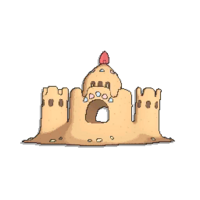
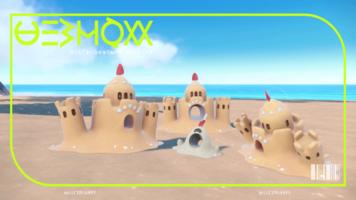
 For other sprites and images, please see Palossand images on the Bulbagarden Archives.
For other sprites and images, please see Palossand images on the Bulbagarden Archives.

